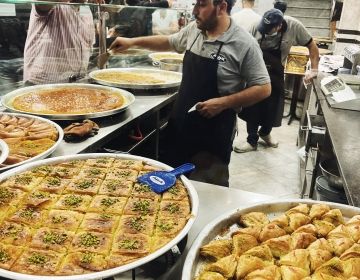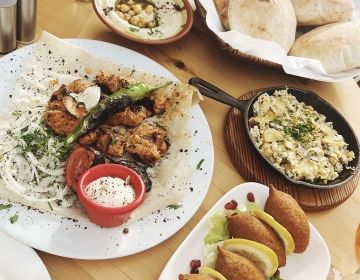Speaking Arabic in Amman: Sometimes It’s Better not to Try to Be a Normal Person
I suppose I should preface this entry with a disclaimer. While the following events described are not necessarily positive, this is meant to lambast neither the CIEE Amman program nor the good people of Jordan. These are simply some snippets of my two months in Amman, in which speaking Arabic did not work to my favor.
I could have christened my first blog post here with a more glorious title, such as “Arabic Adventures in Amman” or “111 Arabic Nights”, but this about sums up my thoughts on the matter. I have spent most of my life in the state of California, with little tourism to speak of even within the United States other than that seemingly-ubiquitous Washington DC trip kids can take at the end of junior high. As such, there were some naive ideas in my head about travelling to different countries, mainly a less-than-conditional adherence to “when in Rome, do as the Romans do”.
Prior to my exile from SFO, I had good a year of Arabic under my belt (two and a half months of summer decay notwithstanding). I recognized that although I was significantly limited and was only able to speak broken Maghrebi dialects, I was willing to make an effort and do my best to speak Arabic in an Arab country. I felt a bit bad about the idea of imposing English on a conversation from the get-go, especially considering the history of Anglophone nations in this corner of the world.
My customs officer at the Queen Alia Airport apparently felt differently.
It was about 21 hours since flying out from the states, and my mind was more than a little scrambled. Sleep deprivation, jetlag, and airline mystery meat tend to do that. Yet, I was willing to speak in Ammon as the Ammonites do. And the first words out of my mouth were:
“Ana hona li-adrus 3arabi.” (I am here for I study Arabic.)
Interesting way to spell a death sentence.
Over the next 10 minutes, I got laughed at, barraged with questions about what hotel I’m staying at and why I’m here, had my name butchered, and probably got called “aswad” (black). A managerial figure needed to be called over to let me through. While it was frustrating, it was probably the name butchering that got me. I don’t think that even a tweaker on 2nd Street back home would be able to get “Manshorts” from “Monuchroth”. Meanwhile, my fellow traveller from California, Johnny Anglosaxon, got a relatively uneventful and quiet welcome to Jordan at the booth next to me. It really do be like that sometimes.
A month later, I had to get my residency renewed at the police station. It was not the best morning to do so, considering my phone was at 4% battery power. But I’d already taken the taxi, and the sunk-cost fallacy won out. Upon arriving there, I got told that I was an hour early (it was 7:30 am), and was told to wait for an hour. One of the officers on guard at the front said something in Arabic about smoking cigarettes. At first I thought that he was offering me a ciggie, but as it turned out, that wasn’t it. He was telling me to buy a pack for him.
At this point, I remembered the fact that nonverbal communication had been humanity’s friend far longer than verbal communication. Thus, I smiled and waved goodbye.
An hour later, armed with proper timing and a classmate in the area with a similar dilemma, I tried once again to get my residency renewed. Though the station was open and there were no ciggie-soliciting guards in sight, I was instead faced with the particularly obstinate officer heading the Foreigner’s Office. I told him “Ana Talib min Amrika, a7taj qama,” (“I am a student from America, I need a residency,”) and handed him my (very American) passport.
When in Ammon, speak as the Ammonites do.
He did not believe that I was an American or a student. Not even the housing information sheet for my program had an effect, if his repeated questions about hotels were any indication. My classmate tried to put in some words for us in Arabic, but no dice. For our trouble, we got an angry rant in Arabic from him, two words of which I understood, and one which was an English word. After some closing remarks best left out of this blog entry, my classmate and I left to school.
En route, our taxi driver told us never to speak Arabic to the police, especially if we’re foreigners. It really do be like that sometimes.
With all of this being said, is it okay to speak as the Ammonites do when in Ammon?
The answer is “yes”. Albeit a more-than-conditional “yes” than I would have given upon touchdown on September 2nd, but a “yes” is a “yes” nonetheless. After all, speaking Arabic in the shops, at the restaurants, and on the streets has yet to result in misfortune for me. Every one genuine smile I've gotten for my broken Arabic is worth two headaches. May the beatings continue until morale improves.
If it's one thing I wish I told myself at the start of all this, it's that I shouldn't be afraid to leverage my status as a tourist and as an American here. Sometimes, it's better not to try to be a normal person.
Related Posts
Have a Sweet Tooth? Jordan Has You Covered.
Jordanian cuisine is rich and diverse, and the country's desserts are no exception. From sweet and sticky pastries to delicate floral-infused cakes, Jordanian desserts are a must-try for any foodie... keep reading
How to Pack Like a Pro
Studying abroad can be a life-changing experience, but it can also be overwhelming to pack for an extended stay in a foreign country. Here's a packing list for studying abroad... keep reading
Must-Try Cuisine in Amman, Jordan!
Jordanian cuisine is a delicious and unique blend of flavors from the Middle East, North Africa, and the Mediterranean. Here are the five most famous Jordanian dishes that you must... keep reading



